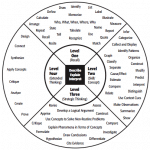Is a Standard a Competency? (Part 1)
CompetencyWorks Blog
Here are links to NH math competencies and ELA competencies
The answer simply is ‘no’. Standards represent the ‘what’ of school—what we need to know, and what we need to be able to do. These standards may be identified as essential or important and may be mapped using local, state, or national frameworks.
When New Hampshire mandated that a high school student could only gain credit for a course when mastery of the course competency was demonstrated, teachers had to write course competencies. It forced the question: What is a competency?
Clearly, recall of facts and content, despite being tested regularly, has been the traditional evidence of student learning and thus became course competencies to many. But, competency implies much more than content and skills. By its very definition, competency requires that a student be able to transfer content and skill in a particular setting. We use competency as a benchmark in most areas of life except education. My surgeon is competent when she not only knows the anatomy of my abdomen, but can also skillfully remove my appendix when needed. My accountant can add, subtract, multiply and divide, but I am counting on his competency to use those skills when problem solving the data I give him to correctly calculate my taxes.
Is it just enough for us to say that in education we are standards based? Does that result in students who are competent? Not necessarily so. We do need to have students learning what they should know and be able to do within a discipline. However, competency really speaks to a depth of knowledge that is beyond knowledge of content and skills. Competency requires that students acquire, make meaning of, and also transfer their content and skills.
Herein lies the black hole of standards based learning. So much learning time is spent on acquisition of content and skills identified in standards, that little time is left for students to apply this content and skill in performance tasks that would lead to true mastery. Is it any wonder that students cannot assess out at high levels if, in fact, their level of learning is at low levels of acquisition in order to cover the standards? Is it fair for students to learn at one level and be assessed at another?
The challenge ahead in competency education is see to recognize this black hole we have been staring at for so long in the move to standards based education. We need to soon see the light that standards are not the outcomes of learning.
__________About the Author__________
Rose Colby is an experienced educator. She t aught high school biology and chemistry and has served as assistant principal and principal at several middle and high schools. She has been working with schools to develop competency-based learning and assessment models for the past three years. She is the co-author with Fred Bramante of Off the Clock: Moving from Time to Competency.
aught high school biology and chemistry and has served as assistant principal and principal at several middle and high schools. She has been working with schools to develop competency-based learning and assessment models for the past three years. She is the co-author with Fred Bramante of Off the Clock: Moving from Time to Competency.
 Read Part 2.
Read Part 2.